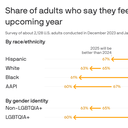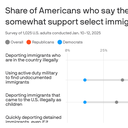Focus group: Arizona swing voters to Trump, Musk: Keep it coming
Every Arizona swing voter in our latest Engagious/Sago focus groups said they approve of President Trump's actions since taking office — and most also support Elon Musk's efforts to slash government.
Why it matters: Public opinion can constrain presidents when Congress does not. But these 11 voters — all of whom backed Joe Biden in 2020 but switched to Trump last November — said they're good with Trump aggressively testing disruptive, expansionist expressions of presidential power that are piling up in court challenges.
- It's needed to "get America back on track," one participant said.
What we're watching: One notable area of disagreement with Trump: The idea of the U.S. displacing Palestinians and taking over and redeveloping Gaza. These swing voters want Trump to stick with Americans' needs inside the U.S.
- Some would like to see him do more, sooner, to rein in consumer costs. But several said they don't mind that Trump's early actions haven't primarily focused on inflation — even when that was their top issue in the election — and said they can be patient if prices don't come down for a while.
- Several doubt the warnings that tariffs may translate to long-term price increases for American consumers.
- Several expressed views that "waste, fraud and abuse" are so prevalent that government agencies can be slashed or eliminated without hurting services on which they depend.
How it works: The voters participated in two online focus groups, conducted Feb. 11. They included 11 Arizonans who backed Trump last year, after rejecting Trump for Biden in 2020. Eight were independents, two were Republicans and one was a Democrat.
- While a focus group is not a statistically significant sample like a poll, the responses show how some voters are thinking and talking about current events.
What they're saying: "I agree we need the Constitution and we need rules and procedures," said Courtney L., 34. "But at the same time, how are we going to make big changes? If someone like Trump [is] being unconventional, we need him to be doing these things, to be making these executive orders and making these big changes for big changes to happen."
- "I like how he's cleaning house in the government," said Jonas G., 55.
- "I approve because I believe he's transparent, and we haven't had that for the last four years," said Ann B., 54.
- Other respondents were supportive of Trump's executive orders on immigration and efforts to eliminate diversity, equity and inclusion initiatives.
Seven of the 11 voters rejected that the president is trying to deliberately "flood the zone" to dilute attention on any one action.
- Trump "has to get started early on as soon as he gets elected into office, get to work," said Melvin G., 30.
- "He said he was going to do this, this, this and this, and this is what he is starting to get done," said Ann B.
Eight of the 11 respondents also said they approve of Musk's efforts in the administration.
- Few had concerns Musk is motivated by personal gain — or that his status as the world's richest man, who controls companies with billions of dollars in government contracts and faces investigations and regulatory hurdles, presents conflicts of interest.
The big picture: The number of executive orders that Trump has issued in his first weeks in office is unprecedented, a strategy that has overwhelmed Democrats trying to mount any semblance of a resistance. But Trump's rapid changes to government have already hit numerous legal roadblocks — and many of these challenges could eventually end up at the Supreme Court.
- Vice President JD Vance and other prominent Republicans this week expressed the sentiment that "judges aren't allowed to control the executive's legitimate power."
- This view has raised concerns from Democrats and even some GOP lawmakers that the Trump administration could flout an eventual court ruling.
The Arizona swing voters rejected concerns Trump could subvert the judiciary.
- "That wouldn't happen. I'm not even thinking about it," said Jonas G., when asked about the hypothetical of Trump rejecting a Supreme Court decision.
- Ann B. said it's "fearmongering."
The bottom line: "These swing voters are delighted by Musk's Trump-endorsed government housecleaning," said Rich Thau, president of Engagious, who moderated the focus groups.
- "The prospect of a looming constitutional crisis is completely inconceivable to them."
- Trump, Vance and Musk "should be ecstatic" about the 11 swing voters' feedback "and Democrats should be scared to death."
Go deeper: Tracking Trump's executive actions by category





